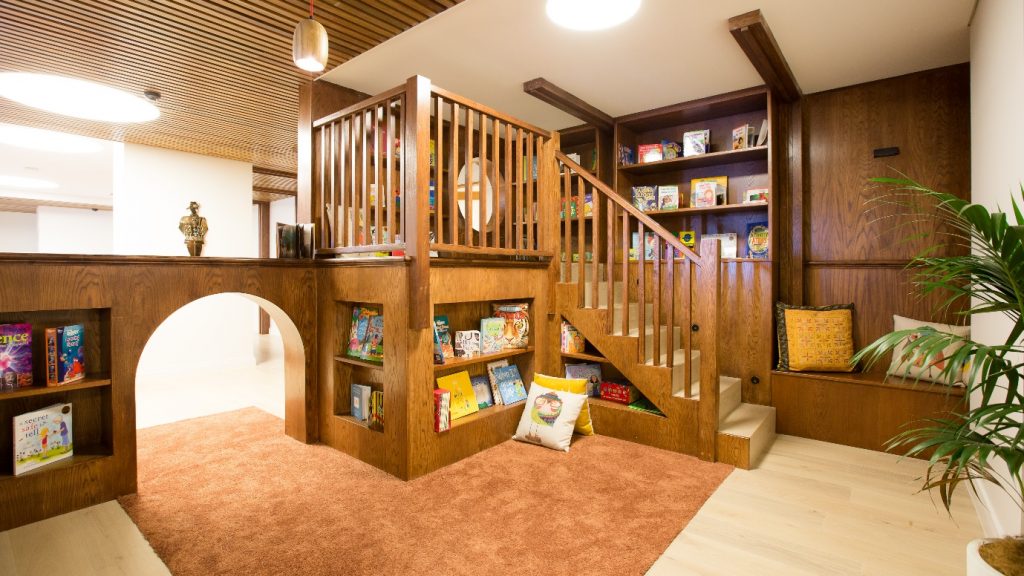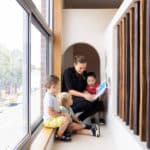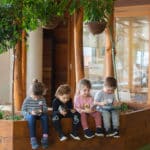ToBeMe has researched the importance of a library in a child’s life and have extracted parts of a paper entitled “Library preschool storytimes: Developing early literacy skills in children” by Judy MacLean ADTED 458 – Dr. Sheila Sherow Summer 2008.
Judy MacLean talks about the benefits of a library. She refers to a “public library” as many children do not have access to a library environment. ToBeMe has recognised these benefits by providing a full library environment for the children at our Early Learning Centres.
Some interesting extracts from Judy MacLean’s paper:
“By capturing a child’s interest and imagination early, librarians intuitively believe that they help children discover that libraries and literacy can be an enjoyable and valued part of their lives. Librarians believe that young children who become regular library users will benefit from the meaningful early literacy experiences available through storytimes. They also believe that this will allow children to develop the early literacy, communication and social skills needed to be ready to learn by the time they enter school.
Do public library storytimes prepare children to be ready to learn when they enter school? Is there scientific research to support these intuitive beliefs or are librarians simply providing a frazzled mother a coffee and a much needed break on a Tuesday morning when they entertain her child? Are public libraries really setting the stage for future successes in learning?
DEFINITIONS
To better understand the role of public libraries in the literacy development of a child, it is necessary to define the terms early literacy, emergent literacy and school readiness.
Early literacy refers to what children know about reading and writing before they actually learn to read and write. It is not the teaching of reading but instead involves the building of a foundation for reading so when children are taught to read, they will be ready (Ghoting, 2006).
“Emergent literacy refers to the early literacy concepts, skills, and positive attitudes that form the foundation for subsequent reading and writing achievement” (Henry, 2004). It is the understanding that print letters have sounds that can create words, and that these words can be read from left to right to tell a story. It involves children playing and being creative by telling, writing or acting out their own stories. These, and other early literacy skills, help to build a solid foundation for literacy learning.
School readiness refers to a combination of the different skills that lead to school success. These include positive early literacy experiences, physical and mental health, social skills, playing well with others, as well as basic cognitive skills, curiosity and enthusiasm about learning (Daimant-Cohen, 2007).
LITERATUREREVIEW
Although educators often vary on their expectations of children entering school, there was general agreement in the literature of six pre-reading skills that children must have before they can learn to read. These act as the building blocks for future success in reading (Utah, [n.d.], Shirley-Kirkland, 2002, Arnold, 2003, Ghoting, 2006). These skills include Print motivation, Vocabulary, Print awareness, Letter knowledge, Narrative skills and Phonological awareness.
A review of the literature shows that there is evidence to support that meaningful literacy activities, such as reading, singing and playing with children, can impact a child’s brain development and subsequently help provide them with the pre-reading skills they need to start school. These literacy activities are found in public library storytimes and provide evidence to support the intuitive beliefs held by librarians that preschool storytimes can and do make a difference!
Results from a 2003 evaluation of the program by Sara Laughlin Associates, show that parents – of every age, educational background, income level, and ethnicity – who participated in the public library early literacy programs significantly increased their literacy behaviours.
Increased literacy behaviours included sharing books, visiting the library, talking to their children and other literacy based activities such as introducing letters and word games to build vocabulary. Teen parents, low-education and low-income parents showed the most significant improvement in literacy behaviours following the program.
Research has shown that library storytimes can make a difference! Public libraries do have an important role to play in helping parents prepare their children be ready learn when they enter school. However, in order to provide the best service possible for the pre-schoolers, it is necessary to consider the recent education and library literature and develop best practices based on these findings.
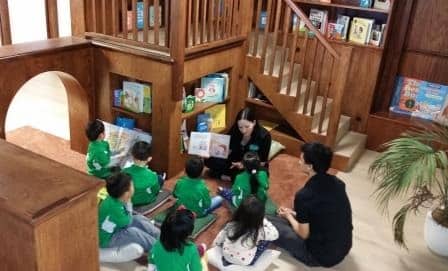
Children enjoying the Library at ToBeMe Early Learning – Burwood
We know that children begin to acquire pre-reading skills from birth. We know that reading to children, talking to them and introducing them to the wonder of the world around them will help in their literacy development. We also know that storytimes provide opportunities for children to interact with one another, engage in dramatic play, learn new words and concepts, and help to gradually increase their attention spans. These are all important for later school success.
How libraries can promote the 6 prereading skills through preschool storytimes:
- Print motivation – thinking that books and reading are fun
- make storytimes fun by being creative and enthusiastic
- vary programs using a variety of activities and story formats
- invite guests with special interests or skills
- create interactive storytimes where children can take part
- Vocabulary – knowing the names of things
- talk, talk, talk and listen twice as much
- help children know that they and their opinions are valued
- ask questions, encourage discussions
- introduce new words and concepts and encourage children to use them
- use descriptive language
- challenge children with both fiction and non-fiction
- read, read, read
- Print awareness – recognizing print and understanding how books work
- use big books and point to words as the story is read to show left to right directionality as well as connections between words and sounds
- explain the format of a book – cover, title, author, illustrator, dedication page
- show children and parents how to hold and share a book together
- provide parents with handouts for rhymes, fingerplays and songs so they can practice at home
- label everything and then point out words in the library
- have children write their own stories by dictating sentences while you write them on a white board
- Letter knowledge – understanding that each letter has its own name and sounds
- Supply magnetic alphabet letters or games
- Sing alphabet songs
- Have posters and writing tools so children can visualize letters and begin to make them
- Use alphabet books
- Encourage children to print their own names on nametags
- Narrative skills – being able to tell stories and describe things
- Provide puppets, costumes, toys or flannel boards so children can create their own stories or act out stories shared during storytime
- Encourage children to tell you what they think the story will be about or, ask for a review of what happened in the story.
- Phonological awareness – being able to recognize and play with the smaller sounds that make up words.
- Play with words, rhymes, songs, poetry
- Read books that have rhythm and rhyming words
- Leave out rhyming words in a story and have children fill in the blanks
- Clap syllables in words and songs
- Emphasize particular letters or sounds in stories or activities”
ToBeMe Early Learning provides exceptional support for children and their vocabulary through the innovation of our on-premise library and THRASS Literacy and Phonetics program
Source: Library preschool storytimes: Developing early literacy skills in children” by Judy MacLean ADTED 458 – Dr. Sheila Sherow Summer 2008 – https://ed.psu.edu/goodling-institute/professional-development/judy-maclean-library-preschool-storytimes
Comments are closed.

